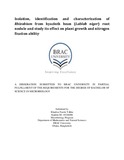Isolation, identification and characterization of Rhizobium from hyacinth bean (Lablab niger) root nodule and study its effect on plant growth and nitrogen fixation ability

View/Open
Date
2016-12-01Publisher
BRAC UniversityAuthor
Yshita, Khadiza NasrinMetadata
Show full item recordAbstract
Symbiotic systems for biological nitrogen fixation (BNF) in agriculture are most promising. Accordingly, the present study was conducted for the isolation, identification, and characterization of nitrogen-fixing bacterial strains Rhizobium from the legume plant hyacinth bean which grows widely in almost every area of Bangladesh. Nitrogen fixation is the reduction of N2 (atmospheric nitrogen) to NH3 (ammonia) which is made possible by the enzyme nitrogenase. Strains of root-nodulating bacteria were isolated from root a nodule of Lablab niger known as hyacinth bean. After confirmation test with yeast mannitol agar (YMA), isolates were collected for morphological and biochemical characterization. For nitrogen fixation test, healthy seeds of hyacinth bean were used for pot trials. Previously sterile soil of one pot (marked with green colour) was inoculated with Rhizobium sp. isolated and identified in the present study and another pot (marked in white colour) was not inoculated with bacteria. Four seeds were sown in each pot and two seeds were germinated on green pot whereas one of four seeds was germinated on white pot. After forty-five days of seed sowing, the plant grown in a pot with Rhizobium showed nodulation. Plants from the same pot were healthier than the plant of other pot (white).
